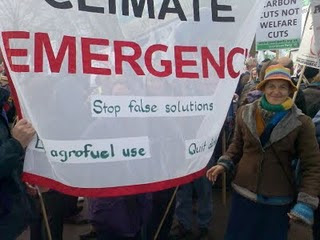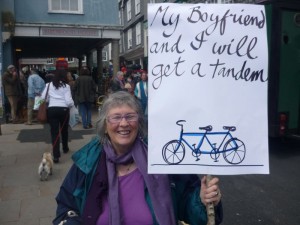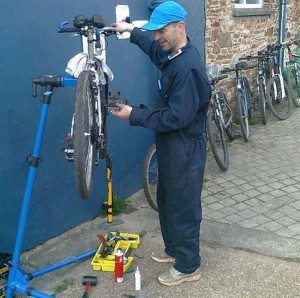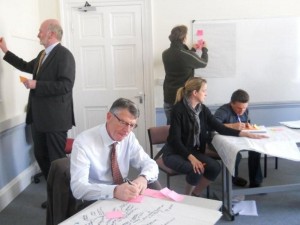Vancouver's Leader in Transition toward Strong, Resilient, Complete Communities
An article on "Activism and Transition" from Transition Network UK Newsletter by Charlotte Du Cann from Transition Norwich and Bungay and editor of the soon to come 'Social Reporting' pilot

To take in what is happening an inter-disciplinary vision is necessary in order to connect ‘the fields’ that are institutionally kept separate. John Berger, Hold Everything Dear“No is one of the most honourable words in the English language,” said Deepak. “It needs to be reclaimed.” Deepak Rughani is a campaigner and co-director of Biofuelwatch and he's talking about the defence of natural ecosystems, an area he feels the Transition movement ignores. Without action to prevent the exploitation of the wild lands reduction of carbon emissions becomes meaningless. Without stringent protection of the pristine grasslands and rain forest in the Amazon basin the world’s rainfall patterns are dramatically disturbed and thus our ability to feed ourselves.
I’m researching a piece for the Transition newsletter about the relationship between activism and Transition and finding it’s a giant subject. Too large really for one voice and one blog. People are finding it hard to put their experiences into one pithy sentence. And when we say activism what exactly do we mean? Does this include strategic campaigning and grassroots community activism, as well as direct action and civil disobedience?
I had met Deepak at our recent meeting to discuss Nicole Foss's talk on financial deflation and the economic future where he had given an introductory overview. That’s when I noticed a shift that was happening in Transition. We had been working diligently on our community projects, building culture and infrastructure, when BAM! the world stormed right back into the room. Although we were talking about local solutions we were also debating the big global issues: civil liberties, civil disobedience. The cafe was packed. There was a buzz in the air I hadn’t felt in a long while. It brought a reality and an urgency into play that had been missing.
2011 is not 2010. It is the year when politics came back into all our lives, as we found ourselves marching against the Government's public spending cuts, watching the uprisings in the Middle East with fast-beating hearts - a time when we are being challenged to take a stand in a way that was no longer just about saying Yes
It's frustrating that (activism) is usually framed as "negative" campaigning, as it's all about making a more positive world and those positive messages are usually there but just not heard as loudly. For example the campaign "against" GM crops also pushed the alternatives of organic very heavily, campaigners "against" nuclear power sing the praises of renewables, and "anti"-incineration campaigners promote reduction of waste, effective recycling etc. Climate Camp not only highlighted problems but modeled a sustainable eco-village of thousands with its own energy production, grey water, compost loos, vegan food, democratic decision making structures etc. Far more than just opposing stuff. As I said before - holistic. (Rhizome Co-op from the Transition Network Forum on Activism and Transition
Replies to This Discussion
-
Reply from Rob Hopkins
Transition and activism: a response
 This post is a response to Charlotte DuCann’s beautiful and heartfelt post over on the Transition Norwich blog arguing that Transition needs to more explicitly embrace activism. It is wonderful to see, whether through that blog, through Transition Voice, or through the emerging social reporting project, new voices coming through in the Transition blogosphere. Charlotte speaks powerfully to the split that some of those engaged in Transition feel, that they almost need to keep their activism ‘in the closet’ in order to remain engaged. She states that she sees her post as a ‘working document’, and invites reflections, so here are a few of mine.
This post is a response to Charlotte DuCann’s beautiful and heartfelt post over on the Transition Norwich blog arguing that Transition needs to more explicitly embrace activism. It is wonderful to see, whether through that blog, through Transition Voice, or through the emerging social reporting project, new voices coming through in the Transition blogosphere. Charlotte speaks powerfully to the split that some of those engaged in Transition feel, that they almost need to keep their activism ‘in the closet’ in order to remain engaged. She states that she sees her post as a ‘working document’, and invites reflections, so here are a few of mine.Personally speaking, while there is much in the post that I agree with, there is a fundamental point I profoundly disagree with. Charlotte writes “to embrace activism as a dynamic force within the whole pattern of Transition strengthens it”. My very strong concern is that in fact it does just the opposite, and I will try here to explain why I think that. Transition is often portrayed as somehow ignoring politics, as being about a retreat from politics. As our Australian academic friend I wrote about last week wrote to me in another example of completely missing the point, “there are many good elements in the transitions movement, but it is in danger of becoming localised cultural relativism. The lack of political voice lends itself to a bystander culture. If we truly want to empower people we need to put the politics back into discourse. Everyone has a right to fully understand the world they live in”.
I would argue very strongly that Transition’s non-embracing of activism has actually been one of its great strengths, and is in fact deeply political, but in a different way. Charlotte quotes a member of the Rhizome Co-operative writing on the Transition Network Forum who wrote that “Climate Camp not only highlighted problems but modeled a sustainable eco-village of thousands with its own energy production, grey water, compost loos, vegan food, democratic decision making structures etc. Far more than just opposing stuff”. Later in the piece Charlotte wrote:
“We have to see that without talking about our actions, without coming out about our radical nature, without sharing our private thoughts about the future, all our self-education that includes Marxist theory, Noam Chomsky, Naomi Klein, the history of Levellers and Diggers, without connecting with all the land sovereignty movements that now exist around the world, Transition does not have the strength or wit or daring to challenge the dominant worldview”.
I think it is important here to take a step back here and take a closer look at that. There is often a lament within Transition, although there is a great deal of great work going on to tackle it, that Transition is a white and middle class movement, that it is failing to gain traction beyond the ‘usual suspects’. Danielle Cohen of Transition Stoke Newington recently published the research she did there about diversity, which included an interview with one young black woman who was one of the group’s founders. She said:
“I didn’t feel there were that many people like me … I remember being in a meeting and there was someone just chatting complete s*** for 15 minutes… I often just found it really hard to talk”.
I think that Transition has been quite skilful over the last 5 years in creating an approach and a vision that appeals beyond the usual suspects. While “compost loos, vegan food and democratic decision making structures” may inspire those who go to Climate Camp, they may well have the opposite effect on those we are actively trying to engage. We talk of people being ‘hard to reach’, but often the language activists use, the way they communicate, dress, speak, and present their arguments means, ironically, that they make themselves ‘hard to reach’ for most ordinary people.
Likewise, “sharing … all our self-education that includes Marxist theory, Noam Chomsky, Naomi Klein, the history of Levellers and Diggers” is almost certain to relegate Transition to being seen as yet another deep green, left wing campaign group. If Transition groups are expected now to make space for the sharing of such insights, are we also prepared to create space for sharing for those who come from very different cultural backgrounds, as well as those who enjoy ‘Top Gear’, who work in industry, or who drive trucks for a living? For me, a Transition group comes together to pursue an explicit mission, to make their community more resilient, more viable, more diverse, more entrepreneurial and happier. That’s the focus, not explicitly on each person’s personal political influences. If it were, we might just as likely have Transition groups that are only open to people who like particular genres of music or support particular football teams. Charlotte argues that not incorporating an explicit role for activism in Transition “risks fragmenting” it, my very real fear would be that the opposite is far more likely.
 Let me give you a couple of examples from Totnes, the Transition initiative I am most familiar with. Ben Brangwyn, my colleague at Transition Network, has recently begun running ‘Dr. Bike‘ on Saturdays at Totnes market (see right). The overt political statement goes no further than the tagline on his website “Keeping Totnes on two wheels rather than four”. He offers free bike maintenance to anyone who turns up. When, having had their bike fixed, they are told it is free or just for donations, some people have been known to well up with tears. I don’t have any figures to back it up, but I would hazard that Dr Bike has probably done more to get people cycling again in the town than all manner of political lobbying or campaigning that has taken place in recent years.
Let me give you a couple of examples from Totnes, the Transition initiative I am most familiar with. Ben Brangwyn, my colleague at Transition Network, has recently begun running ‘Dr. Bike‘ on Saturdays at Totnes market (see right). The overt political statement goes no further than the tagline on his website “Keeping Totnes on two wheels rather than four”. He offers free bike maintenance to anyone who turns up. When, having had their bike fixed, they are told it is free or just for donations, some people have been known to well up with tears. I don’t have any figures to back it up, but I would hazard that Dr Bike has probably done more to get people cycling again in the town than all manner of political lobbying or campaigning that has taken place in recent years.Another example. The secondary school in Totnes is proposing to turn itself into a co-operative Trust school, a really exciting development that offers many opportunities for the community to really get involved in the future of the school, as well as to take ownership of the site on which it stands. A Trust needs partners, and the first organisation to be asked to be a partner was Transition Town Totnes (the other initial one was the Co-operative Society). We think this is a hugely exciting opportunity to really explore with them what a ‘Transition School’ might look like in practice. It hasn’t been a choice without controversy though. A letter in this week’s Totnes Times argued “I am not sure I wish to have any pressure group directly involved and able to influence my children’s school”. In response I wrote:
“TTT is not a campaigning organisation. We do not have any party political allegiances and indeed have people engaged with us from all political perspectives. We do not lobby or campaign. Our focus is on making change happen on the ground, on helping the economy of this place to become more robust and reduce its impact. Indeed in that way we are very similar to KEVICC’s other initial partner, the Co-operative, who were set up 150 years ago with similar aims of promoting bottom-up economic resilience”.

Last week's first meeting of the Economic Blueprint group in Totnes. Participants include Tony Whitty (former Mayor) and Richard Sheard (CEO South Hams District Council)...
My strong sense is that if we had spent the past four years campaigning against things in the town, very visibly aligning ourselves to particular causes or political perspectives, railing against things we felt ideologically opposed to, that opportunities such as being a partner with the local school simply wouldn’t arise. Nor would the opportunity to work with our Town Council that is now keen to be a ‘Transition Town Council’. Nor would the work we are now starting to develop an ‘Economic Blueprint’ for Totnes and district with the Town Council, the Chamber of Commerce, the District Council and other local organisations. Nor would we have been asked to be on the steering group of Dartington Hall Trust’s Land Use Review, which is nearing completion (one of the largest landowners around the town) and which, in its current draft states “we believe that this will enable Dartington to model localisation as a vehicle for a new economics in transition, for rural regeneration, social entrepreneurship and job creation”. Nor would the BBC programme ‘Towns’ which will be screened in September which we hope will present Transition thinking to a much wider audience. I could go on…
What I am trying to say I guess comes back to that quote I keep using from Tove Jansson’s ‘Comet in Moominland’:
“It was a funny little path, winding here and there, dashing off in different directions, and sometimes even tying a knot in itself from sheer joy. (You don’t get tired of a path like that, and I’m not sure that it doesn’t get you home quicker in the end).”
What I take from the Moomin quote is that perhaps an approach which approaches change like innoculating a community with mycorrhizal fungus that runs and spreads and pops up in the most unexpected places but which operates below the radar will, in the long run, be more successful than traditional activism. Joanna Macy, as Liz Day points out in the forum thread on this subject, argues the need for three strands to change:
1. Creating alternatives (local currencies, eco-housing, farm share schemes, etc etc)
2. Shift in consciousness – deepening insight about our planet and the place of human beings in the cosmos, and increased understanding of what needs to change, ie. the nature of the Industrial Growth System and what’s unsustainable about it.
3. Holding actions in defence of life – lobbying, campaigning, etc.
What I am arguing here, in essence, is that for the first and second of these to be most effective and to go a deep as possible, they will be far more effective if they stand on distinctly different ground from the third. That is not to say that I don’t see many of those involved in more traditional activism and direct action as incredibly brave, ingenious, compassionate, creative and resourceful. What Transition Heathrow have done has been extraordinary. The stepping up of 350.org and its new focus on activism is very exciting to see. But I also agree with Dirk Campbell who Charlotte quotes as saying “while these categories overlap and provide mutual positive reinforcement, they preserve functionality best by remaining distinct”. Both things are more skilful and powerful through standing on their own distinct ground, in my opinion.
I appreciate the danger that for those engaged in Transition it might lead to a sense of perhaps being slightly schizophrenic, of living an ‘activist life’ and a ‘Transition life’ and having to keep changing hats. However, I think that there is much to be gained from seeing that as an opportunity rather than an inhibitor. When involved in Transition we often hope that people with a background in commerce, creating enterprises, the legal aspects of Transition, local councillors and so on will get involved in the Transition process and bring those vital expertise … but are we as interested in hearing their stories, where they were for the weekend while we were off protesting in Scotland against imported woodchip biomass, or who their sources of inspiration are?
Charlotte writes that “2011 is not 2010. It is the year when politics came back into all our lives”. This is undoubtedly true, as libraries are closed, public services are slashed and so on. Yet for me, rather than thinking that therefore Transition needs to explicitly don an activism hat and “lock on” as Charlotte puts it, I feel that the opposite is true, that it is even more urgent that we are successful in arguing the case for economic localisation and resilience, and that we model it in practice, creating new viable businesses, influencing Council decisions, creating broad networks of organisations, working with local business, bringing investment and expertise in to support this. The question, ultimately, is does creating a culture of explicit activism slow this work down or accelerate this? My sense, very strongly, is that it hinders it, and risks pushing the initiative, and the very idea of Transition, into a siding from which it will struggle to re-emerge.
When I was 24 and living in Bristol, I got over, as often as I could, to Batheaston, for the protests against a new bypass which was carving a slice off the side of Solsbury Hill, clearing ancient woodland, trashing some of the most beautiful English countryside in order to save commuters 2 minutes journey time. It was insanity, and it was heartbreaking. I remember one Sunday arriving there in time for some big action where the contractors were trying to move a digger or something, and there was a big rush to try and get on it. I found myself in a huge crush of people, nose to nose with one of the security guards, in his luminous jacket and hard hat. The security had mostly been brought in from low-income estates in the North East, and I said to the guy, “why are you doing this? Why are you giving your time and energy to protecting something like this?” “For my family” he said. “Well, that’s why I’m here too” I replied.
It struck me really hard that day that perhaps the route to real change, long-lasting and deep change, isn’t through deepening polarity, but through a re-weaving of what has been torn apart, a seeking of common ground, an appeal to universal values, creating a safe space where people can sit together and not feel judged, and through the creation of viable, nurturing and life-affirming alternatives that have a strong and broad sense of ownership. For me, the idea that “activism as a dynamic force within the whole pattern of Transition strengthens it” is deeply flawed, and risks undoing much of the good work of the last 5 years. Discuss
-
Reply to Rob Hopkins From Kathryn Cholette Village Vancouver Transition Network.
I have no difficulty seeing that the activism described by Charlotte Du Cann and the Transition Movement’s "on the ground projects" described by Rob Hopkins, can be treated as two arms of the social change movement.
My concern, as I ponder the potential effectiveness of the Transition Movement, is that I believe we all have an obligation to understand the forces which shape our world, and I do not think anyone, even the most ardent Transitioner can ignore this responsibility. I believe there is an intellectual component to transition which goes beyond understanding what is going wrong. We also need to know why things are going wrong, not just in how we live our lives, and how we live in community, but also we need to understand what is wrong with our system. I know many Transitioners do have this understanding, but I believe we have reached the point historically where time is short and all social change efforts need to include awareness building on this level. With the perils we face there is no time or place for naivety in the general population.
We need to understand how our institutions and those with the power to shape the institutions have profoundly negatively impacted on our world and the world’s peoples. Life on this planet, as we know it, is in peril. If larger forces are destroying the natural world and we allow them to continue, our personal efforts will be to no avail. Ground level change in our lives will be of no avail if we continue to legitimize a legal system, financial system, and economic system that operates on principles that work against the needs of society while damaging the life support systems on our planet.
If we fail as communities to delegitimize the wider system and work to remove the institutional blocks that will be coming our way, we will be undermined. We will be undermined if we fail to foresee that those who like the status quo and those who have faith in the existing institutional structure will allow it to continue the destruction. Delegitimizing the present system and having a vision of the new institutions that we need is crucial to successful transition.
We need in our communities, to be surrounded by people who not only know what to do on the ground, but what support they expect from the wider system.
In my mind the Transition movement needs a wing that makes certain its members know what changes to demand on every institutional level so we are supported in our grassroots efforts to create a new way of being in the world.
© 2024 Created by Yael Stav.
Powered by
![]()